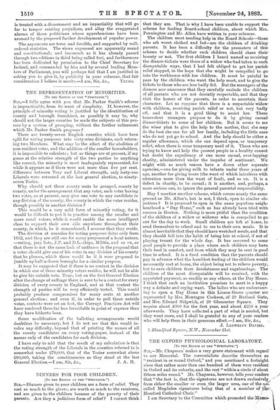DINNERS FOR POOR CHILDREN.
170 THE EDITOR OF THE " SPECTATOR:1
Sra,—Dinners given to poor children are a form of relief. They cost so much to the givers, are worth so much to the receivers, and are given to the children because of the poverty of their parents. Are they a judicious form of relief? I cannot think that they are. That is why I have been unable to support the scheme for feeding Board-school children, about which Mrs.. Pennington and Mr. Allen have written in your columns.
The children most needing help in the Board Schools—those who ar'e worst clothed and fed—are the children of drinking parents. It has been a difficulty for the promoters of thin. schemeto decide whether such children ihould share their bounty or not. The first children I heard named as receiving the dinner-tickets were those of a widow who ?had taken to such disreputable ways, that I had felt obliged to get her parish relief stopped, in the hope that she might be compelled to go. into the workhouse with her children. It must be painful to pass by the children who want the help most, and to give the tickets to those who are less badly fed. But the managers of the dinners now announce that they carefully exclude the children of all parents who are not decently respectable, and that they visit the homes of the parents, in order to ascertain their character. Let us suppose that there is a respectable widow- with children, receiving parish relief or not, but very badly off, and that it is a good thing to assist her. These benevolent strangers propose to do it by giving casual dinner-tickets to some of her children. But it seems to me the wiser plan to give the help to the mother, that she may do the best she can for all her family, including the, little ones who do not yet go to school. And the help should be either a regular allowance, which she can depend upon; or temporary relief, when there is some temporary need of it. Those who are. trying to know and help the poorest people in a locality cannot but doubt the expediency of one more casual, over-lapping-. charity, administered under the impulse of sentiment. We might with as much reason have a dozen other separate- agencies,—one for giving milk to infants under three years of age, another for giving boots (the.want of which interferes with education more than the want of food), and so on. It is a detect in charity, to be casual ; it is another, and, perhaps, a more serious one, to ignore the general parental responsibility.
May I mention another scheme, which covers nearly the same- ground as Mr. Allen's, but is not, I think, open to similar ob- jections? It is proposed to open in the same populous neigh- bourhood a "Day Home," such as has already been tried with success in Roston. Nothing is more pitiful than the condition of the children of a widow or widower who is compelled to go out for the day to work. Small children are left at home, to- send themselves to school and to see to their own meals. It is almost inevitable that they should have wretched meals, and that they should fall into the habit of being late at school, if not of playing truant for the whole day. It has occurred to some good people to provide a place, where such children may have their food in comfort, and from which they may be sent in good: time to school. It is a fixed condition that the-parents should pay in advance what the humblest feeding of the children would necessarily cost at home, the object being not to relieve poverty„. but to save children from desolateness and vagabondage. The children of the most disreputable will be received, with the appointed payment, as readily as any others, at the Day Home. I think that such an institution promises to meet in a happy way a definite and crying want. The ladies who are endeavour- ing to open a Day Home in this Lisson-Grove quarter are represented by Mrs. Montague Cookson, of 29 Rutland Gate, and Mrs. Edward Sidgwick, of 29 Gloucester Square. They require about £300 for the first year, and about R2t,0 a year afterwards. They. have collected a part of what is needed, but they want more, and I shall be grateful to any of your readers -
who will help them in their generous effort.—I am, Sir, &c., J. LLEWELYN DA.VIES.
5 Blandford Square, N. W., November 21st.






































 Previous page
Previous page